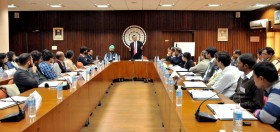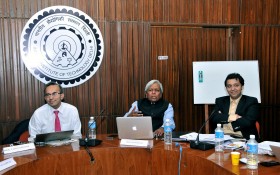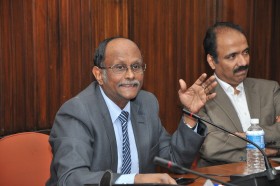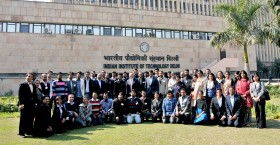From February 2 to 4, 2016, the Harvard University South Asia Institute (SAI), the Indian Institute of Technology, Delhi, and the Tata Trusts hosted a capacity building workshop on the theme ‘Science and Technology-based Social Entrepreneurship in India’. The event brought together 25 organizations from 14 states at the Indian Institute of Technology in Delhi. These organizations have been doing noteworthy work on issues like improving access to electricity in rural areas, providing access to education to underprivileged communities, improving sanitation, and developing tech solutions to maximize social impact.
Through the project on ‘Livelihood Creations in India through Social Entrepreneurship and Skill Development’, SAI and the Tata Trusts have previously hosted workshops on Rural Livelihoods in the Indian Crafts Sector in Gandhinagar Women’s Empowerment in Mumbai.
The session on ‘Successful Entrepreneurship,’ was led by Tarun Khanna, Faculty Director, SAI and Jorge Paulo Lemann Professor, Harvard Business School, Amuleek Singh, Founder and CEO, Chai Point, and Varun Aggarwal, Cofounder and CTO, Aspiring Minds. Khanna discussed the Harvard Business School case study on Aspiring Minds, an organization that uses machine learning and other advanced algorithms to scientifically assess the potential match between a job seeker and open positions in organizations. He probed Aggarwal with many questions that are faced by start-ups.
Amuleek Singh from Chai Point explained the importance of brand-building in a retail customer-focused market. Using the example of Chai Point, he explained that they were among the first organization in India to start having annual tea contracts with corporate firms. He elaborated on a number of product and process innovations that Chai Point had introduced in the market, and also shared his personal journey of learning the nuances that make a tea business successful.
The next session was ‘A Perspective from the Government’ led by Prof. K. VijayRaghavan, Secretary, Department of Biotechnology, Government of India. VijayRaghavan explained how the current central government led by Narendra Modi is giving a stimulus to start-ups. He emphasised that finding strong mentors for a start-up is an essential ingredient for success.
The next session focused on ‘Design for Success and Impact,’ with Prof. Madhusudhan Rao, IIT-Delhi, Ramendra Baoni, Founder, Bisquare Consulting and ECCO Electronics, and Sorin Grama, Promethean Power.
Rao emphasised that the idea of copying products from other countries and tailoring them to local markets to make them affordable does not always work. Relevant and original solutions have to be designed for a given market and geography. Baoni shared his experience of designing select products that have been now sold through a licensing agreement by multinational companies. He mentioned that the user should be at the heart of innovation. According to Grama, who has been working on providing a cooling ecosystem for milk production and storage, user needs and conversations are the best indicators for business decisions.
The first session on Day 2 of the workshop was ‘Perspectives from the Industry’ with G. Sunderraman, Vice-President, Godrej and Boyce, and V. Shashi Kumar, Director, Phoenix Medical Systems.
Kumar have an overview of his start-up story. The idea of medical devices came to him when he had to fix a machine during his engineering studies at the Indian Institute of Technology Madras. This inspired him to start Phoenix Medical Systems Pvt. Ltd. that has now become a market leader in the manufacture and sale of neonatal medical equipment across India. He shared that his two decade experience convinced him that business is all about good relationships and not just monetary transactions.
Sunderraman led the team that made the Godrej Chotukool (a low-cost refrigerator). He shared his experience of working on an innovative idea in a start-up mode within a 115-year-old family-owned organization. He has learned that customers do not buy products, but experiences.
The next session on ‘Leveraging External Resources’ was a panel discussion with Rajneesh Bhandari, President, TiE Rajasthan, Abhishek Sahay, Senior Assistant Director at its Centre for Innovation, Science & Technology Commercialization, FICCI, Jonathan Mazumdar, Entrepreneur in Residence, Sangam Ventures, and Shreya Deb, Principal, Omidyar Network.
Rajneesh Bhandari highlighted what Venture Capitalists (VCs) look for in start-ups. He advised the budding entrepreneurs that the founding team was the most important criterion looked at by VCs. Thereafter, the target market and uniqueness of the problem are important factors. According to Deb, businesses with sustainable and scalable models are preferred by social impact investors. Mazumdar explained how start-ups that have a clear and good grasp of the risks involved in the business are the ones that are preferred for funding, as they understand the business much better than others. Through his experience at FICCI, Abhishek Sahay elaborated on procedures for patenting, copyright and IP protection of ideas by new social enterprises.
Note: This is an abridged summary of the workshop. Please click here to view the full report.




